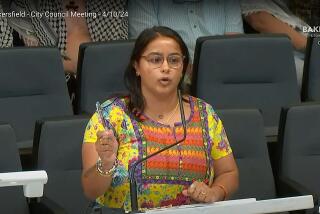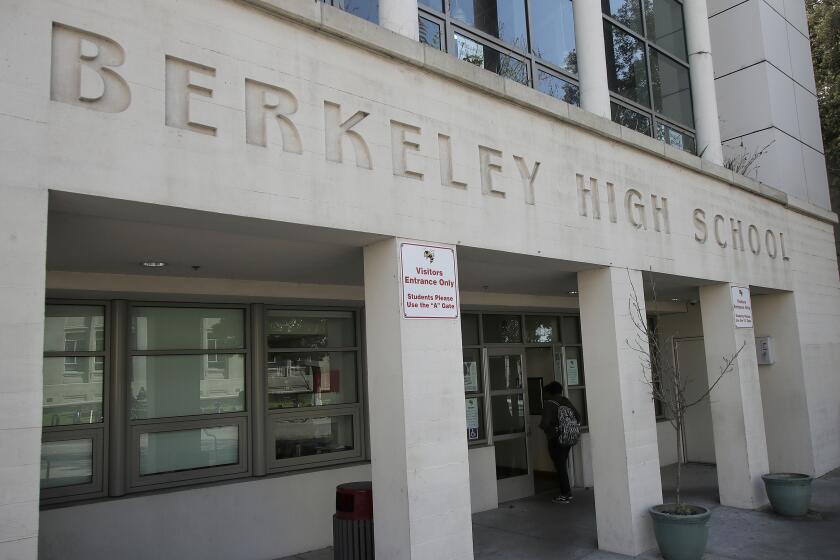Peter Lyman, 66; UC Berkeley professor studied data overload
Peter Lyman, a professor emeritus at UC Berkeley’s School of Information who was known for his research on online information and social networks on the Internet, has died. He was 66.
Lyman, who also was a former USC and UC Berkeley university librarian, died of brain cancer Monday at his home in Berkeley, university officials said.
For those who feel overburdened by information overload, research conducted by a team led by Lyman and fellow UC Berkeley School of Information professor Hal Varian discovered some staggering numbers a few years ago to show why.
According to their widely cited study “How Much Information?,” worldwide information production increased at an average rate of 30% each year from 1999 to 2002.
The amount of new information stored on paper, film, optical and magnetic media doubled during those three years, the researchers reported. And, they said, if the supply of new material saved in 2002 alone were converted to print, it would fill half a million libraries the size of the Library of Congress.
“All of a sudden, almost every aspect of life around the world is being recorded and stored in some information format,” Lyman said in 2003. “That’s a real change in our human ecology.”
The intent of their study, Lyman told the Philadelphia Inquirer in 2004, “was to quantify people’s feelings of being overwhelmed by information and to look at trends. People had no sense of why this was happening or where the growth was.”
In just one scientific field -- global climate data -- the volume of recorded information was expected to skyrocket from 2 billion gigabytes in 2000 to 15 billion gigabytes in 2010.
Lyman presented the last update of the study, which was supported by Microsoft Corp., Intel Corp., Hewlett-Packard Co. and EMC Corp., at an information storage conference in Orlando, Fla., in late 2003.
Among the study’s findings:
* Some 92% of new information is stored in magnetic media, primarily hard drives.
* Although original information on paper continues to grow, most comes in the form of office documents and mail -- not books, newspapers or journals.
* The U.S. produced about 40% of the world’s new stored information.
“This study shows what an enormous challenge we and the rest of the information technology industry face in organizing, summarizing and presenting the vast amount of information mankind is accumulating,” Jim Gray, a Microsoft research scientist, said in 2003.
Varian said he and Lyman “never realized the study would be so widely cited, but it kind of caught the public’s imagination.”
“We did [the study] basically to get some summer jobs for some of our students; nobody had pulled all this information together in one place,” Varian told The Times on Friday.
Describing Lyman as “a wonderful colleague and man,” Varian said that “some of his other work might be more long-lasting” than the “How Much Information?” study.
In 2005, Lyman became the director of the Digital Youth Project, a three-year study of how children use digital media in their everyday lives. The goal of the project, which was funded by the John D. and Catherine T. MacArthur Foundation, is to improve children’s learning experiences and help families and schools use digital media for education.
“Unfortunately,” said Varian, “that work was interrupted by his untimely death.”
Lyman was born in San Francisco in 1940. He earned a bachelor’s degree in philosophy from Stanford University in 1962, a master’s degree in political science from UC Berkeley in 1963 and a doctorate in political science from Stanford in 1972.
He was one of the founders of James Madison College, a residential college at Michigan State University with a public policy focus, and was a faculty member from 1967 to 1987, when he moved to USC.
At USC, he founded and served as executive director of the Center for Scholarly Technology, which established the university as a leader in library information systems. He also served as associate dean for library technology before being appointed university librarian in 1991, and he is credited with leading USC’s libraries into a new technological era.
At UC Berkeley, he served as university librarian from 1994 to 1998. He also became a professor in the school of Information Management & Systems (now the School of Information) in 1994 and served several years as associate dean of the School of Information. He became an emeritus professor in 2006.
Lyman is survived by his wife, Barrie Thorne, a UC Berkeley professor of gender and women’s studies and sociology; a son, Andrew Thorne-Lyman; a daughter, Abigail Thorne-Lyman; twin grandsons; and a sister, Cynthia Lyman.
The School of Information is planning a campus memorial service for early in the fall semester.
--
More to Read
Start your day right
Sign up for Essential California for news, features and recommendations from the L.A. Times and beyond in your inbox six days a week.
You may occasionally receive promotional content from the Los Angeles Times.






